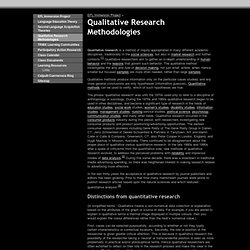

Www.fhi360.org/NR/rdonlyres/etl7vogszehu5s4stpzb3tyqlpp7rojv4waq37elpbyei3tgmc4ty6dunbccfzxtaj2rvbaubzmz4f/overview1.pdf. Projects.exeter.ac.uk/prdsu/helpsheets/Helpsheet09-May03-Unlocked.pdf. Quantitative research. In social sciences, quantitative research is widely used in psychology, economics, sociology, marketing, community health, health & human development, gender and political science, and less frequently in anthropology and history.

Research in mathematical sciences such as physics is also 'quantitative' by definition, though this use of the term differs in context. In the social sciences, the term relates to empirical methods, originating in both philosophical positivism and the history of statistics, which contrast with qualitative research methods. Qualitative methods produce information only on the particular cases studied, and any more general conclusions are only hypotheses. Quantitative methods can be used to verify which of such hypotheses are true.
A comprehensive analysis of 1274 articles published in the top two American sociology journals between 1935 and 2005 found that roughly two thirds of these articles used quantitative methods.[2] Overview[edit] Use of statistics[edit] Qualitative research. In the conventional view, qualitative methods produce information only on the particular cases studied, and any more general conclusions are only propositions (informed assertions).

Quantitative methods can then be used to seek empirical support for such research hypotheses. History[edit] Data collection[edit] Qualitative researchers face many choices related to data collection ranging from grounded theory practice, narratology, storytelling, classical ethnography, or shadowing. Qualitative methods are also loosely present in other methodological approaches, such as action research or actor-network theory. Qualitative research often categorizes data into patterns as the primary basis for organizing and reporting results.
The ways of participating and observing can vary widely from setting to setting. The data that is obtained is streamlined to a definite theme or pattern. Some distinctive qualitative methods are the use of focus groups and key informant interviews. 10. Data analysis[edit] Qualitative Research Methodologies - UNINTER English Language Learning Project. Qualitative research is a method of inquiry appropriated in many different academic disciplines, traditionally in the social sciences, but also in market research and further contexts.[1] Qualitative researchers aim to gather an in-depth understanding of human behavior and the reasons that govern such behavior.

The qualitative method investigates the why and how of decision making, not just what, where, when. Hence, smaller but focused samples are more often needed, rather than large samples. Qualitative methods produce information only on the particular cases studied, and any more general conclusions are only hypotheses (informative guesses). Quantitative methods can be used to verify, which of such hypotheses are true. The phrase 'qualitative research' was until the 1970s used only to refer to a discipline of anthropology or sociology.
In the last thirty years the acceptance of qualitative research by journal publishers and editors has been growing. Data Collection Data analysis Coding. Author Page for Mollick, Ethan R. Beyond Innovators and Imitators: A Taxonomy of Entrepreneurs by Mathew Manimala. Indian Institute of Management BangaloreSeptember 29, 1996 Creativity and Innovation Management, Vol. 5, No. 3, pp. 179-185, September 1996 Abstract: In an earlier study of the policy orientations of innovative entrepreneurs, it was observed that there were considerable variations within the high-innovation and low-innovation groups identified for the purpose of comparing policy orientations. The possibility of identifying sub-types within the two groups was apparent and therefore the sample was subjected to cluster analysis. The most interpretable clusters were obtained when the two groups were clustered separately on the basis of the innovators’ orientations.
Keywords: Entrepreneurship, Innovation JEL Classification: M13 Accepted Paper Series Suggested Citation. Alternative Perspectives on Entrepreneurship Research by Peter Jennings, Lew Perren, Sara Carter. Peter L Jennings Arizona State University (ASU) Lew Perren University of Brighton Sara Carter affiliation not provided to SSRN2005 University of Illinois at Urbana-Champaign's Academy for Entrepreneurial Leadership Historical Research Reference in Entrepreneurship Abstract: This introduction to a special issue of Entrepreneurship: Theory and Practice (March 2005) outlines the content of the issue that includes information on the new paradigms and methods of entrepreneurship research.
University Entrepreneurship: A Taxonomy of the Literature by Frank Rothaermel, Shanti Dewi Anak Agung Istri, Lin Jiang. Frank T. Rothaermel Georgia Institute of Technology Shanti Dewi Anak Agung Istri. Ten Years of Entrepreneurship Education Literature: An Examination of Theoretical Contributions by Rui Baptista, Ana Naia, Carlos Januário, Virgínia Trigo. Rui Baptista Brunel Business School, Brunel University; Instituto Superior Tecnico, University of Lisbon Ana Naia affiliation not provided to SSRN Carlos Januário Virgínia Trigo Instituto Superior de Ciencias do Trabalho e da Empresa (ISCTE)July 16, 2012 Abstract: The present paper addresses the state of the art in theory-building on entrepreneurship education through the analysis of the contributions made roughly over the last decade (2001-2011).
Www.pgbovine.net/PhD-memoir/pguo-PhD-grind.pdf. KMRC - Knowledge Management Research Centre. Inernships for Students - Internships for Students - 12345 : Inernships for Students.